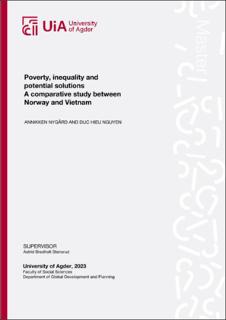Poverty, inequality and potential solutions: A comparative study between Norway and Vietnam
Master thesis
Permanent lenke
https://hdl.handle.net/11250/3085501Utgivelsesdato
2023Metadata
Vis full innførselSamlinger
Sammendrag
Poverty is among the most widely discussed constructs, yet also notably diverse in terms of definitions, perspectives, and related bodies of literature.
With that in sight, this study aims to better understand how poverty is perceived by a variety of stakeholders including poor people, what life lived in poverty feels like, how often inequality caused by poverty occurs, and whether existing welfare structures are sufficiently effective and supportive within the two contrasting national contexts of Norway and Vietnam, using a comparative research design.
Employing a theoretical framework consisting of renowned theories including habitus theory, dependency theory, power and agency, and the capability approach, combined with a qualitative research methodology centered around semi-structured interviews and observation techniques, this research uncovered numerous valuable insights from the perspectives of people living in poverty in Norway and Vietnam, as well as other perspectives including NGOs’ and government officials’. Such findings are consistent with the themes highlighted by the proliferated literature on poverty, yet are fundamentally different between the two national contexts, which points to the concept of “relative poverty” in more than one way. In general, poverty traps, lack of agency, and self-blame are key themes highlighted through conversations with the interviewees.
The research compared the two countries regarding similarities and differences in how poverty is perceived, understood, and experienced in Norway and Vietnam. The findings showed that poverty is similarly experienced as financially unstable and inadequate, stressful, inescapable, degrading, and socially excluded by those living in it and that welfare systems in both countries are unintentionally discriminating, inefficient and ineffective. There are key differences in these aspects between the two nations, which stem from their varying socio- cultural, economic, and regulatory environments. From these observations, the effectiveness of existing supporting structures and especially social welfare systems in both countries are critically analyzed. Hence, recommendations regarding improving existing welfare programs as well as alternative solutions are made.
